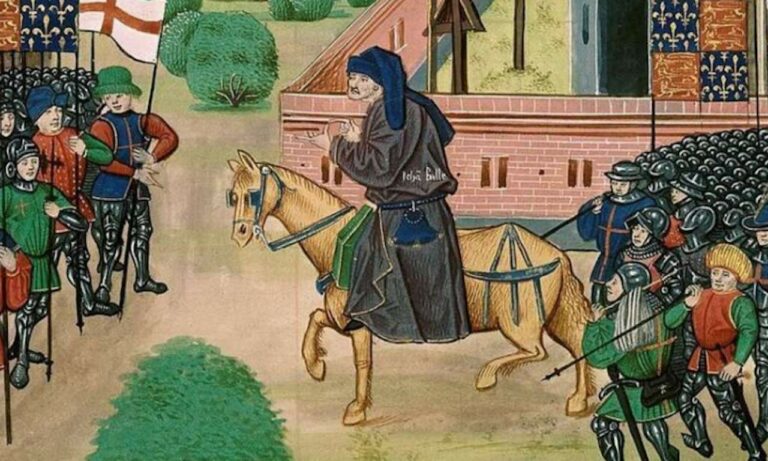Similar Posts

Uprisings after pandemics have happened before – just look at the English Peasant Revolt of 1381
In this 1470 illustration, the radical priest John Ball galvanizes the rebels. The British Library

Russia Out of Ukraine, Disband NATO – Latvian Politician’s Plan for Peace
As the war of attrition between Russia and Ukraine continues to exact a catastrophic death toll for civilians and military forces alike, the prospect of a lasting peace remains elusive. Latvian politician Igor Pimenov denounces President Vladimir Putin’s invasion of Ukraine, calling it a colonial war that also adversely affects the Russian population. Pimenov lays out his proposal for a multilateral peace agreement between Ukraine, Russia, and its European neighbors.

Honest Government Ad | The Recession – Juice Media Satire
The Australien Government has made an ad about the recession, its cuts to Jobseeker/Jobkeeper, tax cuts for the rich, cuts to the Environment Act; and the ‘Gas-led Recovery’ – and it’s surprisingly honest and informative.

Paul Jay – Elon Musk’s Trump Card: Unmasking the Billionaire’s Political Play
Tune in as we peel back the layers of Elon Musk’s surprising support for Donald Trump. Is the tech titan really championing meritocracy and free speech, or is there a hidden agenda? From self-driving cars to space rockets, we’ll explore how Musk’s business empire might benefit from a Trump presidency.
We’ll dive into the contradictions between Musk’s green tech image and Trump’s climate denial, and examine how the world’s richest man views unions, regulations, and the future of AI. Plus, we’ll uncover the personal drama fueling Musk’s political shift.
Get ready for a wild ride through the mind of a maverick billionaire and the potential consequences for us all. Is Musk’s vision of “Making America Greater” a technological utopia or a dystopian nightmare? Listen now and decide for yourself!

From DC Streets to Gaza’s Ruins: Inside Trump’s Unholy Alliance
On August 12, 2025, Donald Trump sent the National Guard into Washington, D.C., just months after deploying troops and Marines into Los Angeles. While militarizing U.S. cities, he stands by as a genocide unfolds in Gaza — shielding Israel diplomatically while U.S. defense contractors profit.
This republished investigation, Trump’s Unholy Alliance, exposes the billionaire-tech, Christian nationalist, and far-right networks behind Trump’s rise. They plan to weaken — or dismantle — what’s left of American democracy. From Peter Thiel’s Palantir AI systems aiding Gaza airstrikes, to Lockheed Martin’s jets and bombs, these same firms stand to cash in on Trump’s “Golden Dome” missile defense and militarization of space — a project that could make nuclear war more likely.
January 6 was only the rehearsal. This is the playbook — at home, abroad, and in orbit.
Watch the full investigation now.

Why Biden Won’t Cancel Student Debt – Michael Hudson
Why is the Fed buying corporate junk bonds and debt but won’t buy out student debt? Michael Hudson on theAnalysis.news with Paul Jay.

Have long enjoyed Gerald’s analysis. But it was only with this interview that I realized how exciting and profound a scholar he is.
This has been a very interesting analysis. Notice that this is written in the past tense. Now if I wrote, “This is an interesting analysis” it takes on a whole different meaning. Same idea with the writing of history when the historian draws a line between the past and the present. The past is portrayed as radically different than the present and there’s an invisible barrier that can never be crossed because the past is gone forever and never to be lived again by anyone. Then what is history? If you look at the classical historians they were the ones that wrote a grand story of an event that took place in the past and wrote the story to be read in the present. Much of it was written as a tall tale and if read today might be considered a work of fantasy, even a made up fiction. But somehow it’s believed to be true enough to be considered that it really happened. Even if there’s a giant and a three headed monster involved in the narrative. So the question becomes what are the facts in the history so there is truth behind the story? This is where stuff gets tricky because someone might ask, “What really is a fact?”
I don’t mean to sound tedious but history has been written the old way, the grand narrative way, for more than 3000 years and it’s not until we get to the last couple of hundred years that history starts to concern itself with uncovering the facts behind any truth. So when a historian goes to an archive and starts looking at accounting records and finds records about the slave trade then slavery becomes a fact. It really took place. There are records available and are even viewable on google scholar that illustrate slavery happening in real time. Now why did slavery take place? One approach would be to say that slavery became an economic necessity because there was a scarcity of labor in the new world. This might be true but does it really explain slavery? It’s not until you start looking at the belief of race, quite the vogue expression in the 19th century, and a desire to explain slavery as it stood back in the 1850s, that you find one dominant group, namely the southern white slave holders, considering themselves superior over blacks because of their race and running an entire economic system in the south through slavery.
If the writing of history is pushed back to the grand narrative event form then there will be a history that will be less true, more fantasy like, and more twisted to fit a mould created to deceive people. In this situation history will become just plain old bullshit. But if you want a real history you have to have facts to make it up, dress it up, take it out on a night on the town, and come home on the Mail Wagon at the crack of dawn.
Whereas Nietzsche elsewhere lamented a lack of historical perspective, he also compared the historian to the crab: he looks backward so long he begins to think backward too. In the interest of simplification it seems to me you are taking the history as more than it need be to the point it confuses. Or confuses your comment because I’m not quite sure what your point is. I’m not so sure Tacitus didn’t employ facts in his histories. And Howard Zinn made clear who makes real history: the collective actions of ordinary people and their quest for justice.